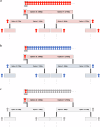Ingroup favoritism and outgroup derogation in intergenerational cooperation
- PMID: 40481314
- PMCID: PMC12144128
- DOI: 10.1038/s44271-025-00272-z
Ingroup favoritism and outgroup derogation in intergenerational cooperation
Abstract
Issues related to sustainability (e.g., climate change and over-fishing) often manifest themselves as intergenerational social dilemmas, where people are faced with a choice between self-serving, unsustainable behavior and sustainable, personally costly behavior. Extending the previous literature on (non-intergenerational) intergroup cooperation, we tested whether group membership of the future generations influenced sustainable decision-making. In two preregistered studies using the intergenerational sustainability dilemma game, we found that individuals were more likely to make a sustainable (vs. selfish) decision when they believed that their current behavior would benefit future ingroup members, whereas more selfish decisions were made when benefits would accrue to outgroup members. These findings held in both the minimal group (Study 1: N = 1393) and national group (Study 2: Japan vs. China, N = 1781) contexts. The effect of ingroup intergenerational membership on cooperation was mediated by higher felt responsibility for future generations in both minimal and national group contexts. The effect of outgroup membership on intergenerational cooperation was mediated by a reduced sense of reputational concern in the minimal group context and by reduced affinity, legacy motivation, and responsibility for future generations in the nationality context.
© 2025. The Author(s).
Conflict of interest statement
Competing interests: The authors declare no competing interests.
Figures
Similar articles
-
Ingroup favoritism in cooperation: a meta-analysis.Psychol Bull. 2014 Nov;140(6):1556-81. doi: 10.1037/a0037737. Epub 2014 Sep 15. Psychol Bull. 2014. PMID: 25222635 Review.
-
The development of ingroup favoritism in repeated social dilemmas.Front Psychol. 2015 Apr 28;6:476. doi: 10.3389/fpsyg.2015.00476. eCollection 2015. Front Psychol. 2015. PMID: 25972821 Free PMC article.
-
Using artificial agents to nudge outgroup altruism and reduce ingroup favoritism in human-agent interaction.Sci Rep. 2024 Jul 9;14(1):15850. doi: 10.1038/s41598-024-64682-5. Sci Rep. 2024. PMID: 38982070 Free PMC article.
-
Existential threat and responses to emotional displays of ingroup and outgroup members.Group Process Intergroup Relat. 2023 Dec;26(8):1866-1887. doi: 10.1177/13684302221128229. Epub 2022 Nov 5. Group Process Intergroup Relat. 2023. PMID: 38021316 Free PMC article.
-
Preferences and beliefs in ingroup favoritism.Front Behav Neurosci. 2015 Feb 13;9:15. doi: 10.3389/fnbeh.2015.00015. eCollection 2015. Front Behav Neurosci. 2015. PMID: 25762906 Free PMC article. Review.
References
-
- Dawes, R. M. Social dilemmas. Annu. Rev. Psychol.31, 169–193 (1980).
-
- Van Lange, P. A. M., Joireman, J., Parks, C. D. & Van Dijk, E. The psychology of social dilemmas: a review. Organ. Behav. Hum. Decis. Process.120, 125–141 (2013).
-
- Wade-Benzoni, K. A. Maple trees and weeping willows: The role of time, uncertainty, and affinity in intergenerational decisions. Negot. Confl. Manag. Res.1, 220–245 (2008).
-
- Balliet, D., Wu, J. & De Dreu, C. K. W. Ingroup favoritism in cooperation: a meta-analysis. Psychol. Bull.140, 1556–1581 (2014). - PubMed
-
- Imada, H., Romano, A. & Mifune, N. Dynamic indirect reciprocity: When is indirect reciprocity bounded by group membership? Evol. Hum. Behav.44, 373–383 (2023).
LinkOut - more resources
Full Text Sources

